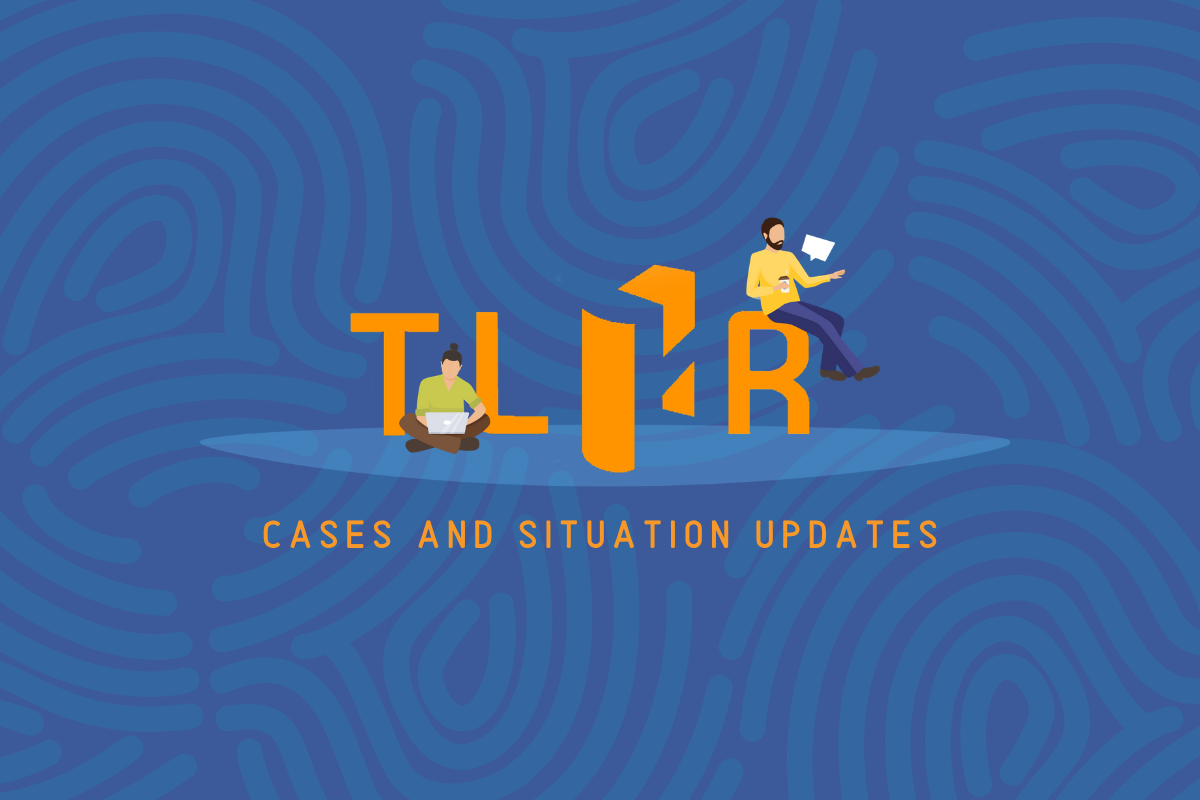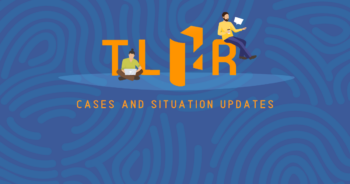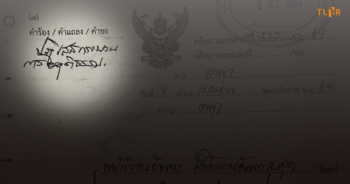With the continuation of COVID 19-related restrictions in January, the authorities have developed legal mechanism for limiting any possibility of public demonstration, and persecuting dissidents on grounds of public health and safety violations. The well-being and political rights of Thai citizens remain gravely unprotected as the abuse of the “lèse-majesté” law is intensified, leading to several charges pressed against not only adults but also junior and senior citizens, notably the case of “Anchan” and her 87-year imprisonment sentence. Activists were reportedly subjected to surveillance by the police, who regularly visited their residences and made enquiries about the targeted activists with neighbors and family members.
Human rights situation amidst the Covid-19 pandemic

The new wave of the spread of Covid-19 infection has led the authorities to impose stricter measures under the Emergency Decree to arrest and prosecute participants of public assemblies.
On 6 January 2021, following the renewed outbreak of the Covid-19 pandemic since the end of December 2020, the government has announced a nationwide extension of the Emergency Decree from 16 January – 28 February 2021, reasoning that several provinces saw cluster infections leading to a rapid increase of new cases in the country. Moreover, an active screening among migrant worker groups has revealed even more cases confirming the necessity of the prolongation, which would be the 11th consecutive month in effect. The TLHR has found that the provisions under the Emergency Decree on public gathering deemed risky of transmission had been constantly used to prosecute students and citizens who partook in political activities. From May 2020 until the end of January 2021, at least 234 people in 96 cases were found to have been accused of breaching the Emergency Decree, including:
— 73 cases under the Emergency Decree aimed to control the spread of Covid-19
— 23 cases during the announcement of the state of serious emergency in Bangkok (from 15 October, 4 a.m. to 22 October, 12 p.m.)
Among these numbers, 29 cases also contain additional charges under the Public Assembly Act, even though its section 3 (6) explicitly requires that the law not be used on public gatherings during the state of emergency. The use of laws to control protests until now has thus resulted in overlapping problem depending on the authorities’ discretion.
Moreover, most cases are still in the investigation process and there is neither evidence that the Court has used the Emergency Decree to punish them nor evidence that they have subsequently led to further spread of Covid-19.
The new wave of the Covid-19 has prompted the authorities to make an arrest and a stronger attempt to curb public activities, which tended to be disproportional including employing a large number of personnel to an event with rather small number of participants. The arrests took place forcefully where individuals were brought to be detained at the Border Patrol Police Region 1 Headquarter in Pathum Thani province instead of the responsible local police station. The arrests were also carried out without legal mandate, for instance, the arrest of the Free Guard members who organized an activity to paint a 112-meter banner at the Victory Monument, the arrest of 6 people in a gathering in Samyan area calling for the release of the detainees on 16 January 2021, two consecutive arrests of the “Kor Kuen Mai Dai Kor Tan (refund not begging)” group in mid-January while group members were holding sign saying #HappyNewYear2021WishUncleTooHappiness and setting up tents in front of the house of government.
Overall human rights situation
Laws continue to be extensively used to prosecute anti-government protestors.

In January 2021, despite no major rallies seen in the second half of 2020 due to the renewed Covid-19 spread in the country, the state authorities have continuously used various charges to prosecute people who exercised their freedom of assembly and expression.
According to the TLHR statistics, in the course of over six months since the Free Youth rally on 18 July 2020 until 31 January 2021, at least 291 people in 183 cases have been prosecuted for political gatherings and expression. Among this number were at least 9 minors below 18 years old.
In January, the accusation against leaders and protestors persisted from last year. It has also been found that the authorities have pressed charges several months after the incidents took place. For example, Montra Pongnin, a lecturer at Phayao University, was accused of violating the Emergency Decree by joining a protest in Phayao in July 2020, on top of the five people who had already been charged previously.
Similarly, “Mimi”, a 17-year-old youth and a member of the Feminist Liberation, has received a charge of violating the Emergency Decree this month for her speech at the rally at Ratchaprasong Intersection on 25 October 2020, after five leaders had earlier. The police explained that they had obtained additional evidence. The police at Chana Songkram Police Station also pressed additional charge under section 116 of the Penal Code on the 15 protestors of the #19Sept rally on 19-20 September 2020.
This month also saw a number of extrajudicial arrests. The authorities seized citizens without telling anyone and allowing outside contacts, including the case of Mr Tossatep Duangnet, a 24-year-old We Volunteer guard. The incident was reported on 17 January 2021, two days after his disappearance, before the group discovered that he was being detained at Bang Kaew Police Station in Samut Prakan province and that the inquiry officer was going to release him at 9 p.m. The officer claimed that they had only pressed charge of violating the Cleanliness Act, even though the arrest record also showed the charge of mischief from spraying the text “Abolish Section 112” in Lad Krabang area.
It was found out later that Tossatep was arrested at his residence in Bang Phli in the evening of 15 January 2021. The police had confiscated his communication device and not informed him his right to lawyer, so his friends could not contact him and no one knew he had been taken.
Lèse-majesté charges skyrocketed.
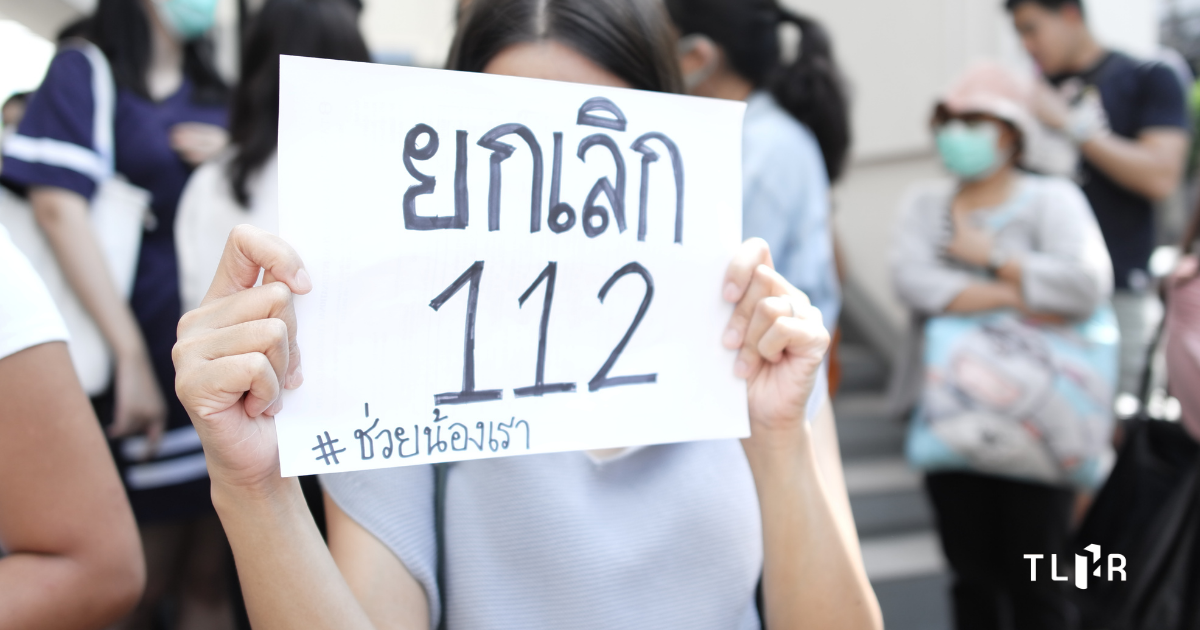
After the government and police officers have taken up the “lèse-majesté” or the section 112 of the Penal Code again since November 2020, the statistics of people prosecuted with it have soared, amount to 55 people in 42 cases in the course of only two months.
Initially, the action was aimed at the “Kana Ratsadon” leaders who appeared speaking on stage at various rallies in the past year. However, an increase in the people prosecuted for posting and sharing opinions online was observed in January. Currently, there are at least 13 lèse-majesté cases and other 27 cases related to public assemblies and expressions.
In the past month, the Court has also issued at least two arrest warrants with section 112 charges, which was not present at the end of 2020. The Thanyaburi Provincial Court ordered the arrest of two Thammasat students for spraying the words “My Tax” and “Abolish Section 112” on the royal portraits in the responsible area of the Klong Luang Police Station. One of them was not involved in the act. Later, the media reported that the police had requested the arrest warrant of that person to be revoked.
The person who was arrested was Mr Sirichai Natueng, a freshman student and a member of the United Front of Thammasat and Demonstration. He was apprehended by more than ten police officers near Thammasat University, Rangsit Campus around 10 p.m. on 13 January 2021 before being taken to the Border Patrol Police Region 1 Headquarter. His residence was also searched without lawyer’s presence. Afterwards, he was brought back to Klong Luang Police Station to be charged with section 112. On the following day, the Thanyaburi Criminal Court approved his detention and granted a bail with 150,000 Baht and a professor’s position in security.
Section 112 has been broadly used on cases many of which had nothing to do with royal insults or defamation but rather criticism of the royal budget or power. Examples include the case of the five people who put signs criticizing the royal budget (the text reads “Royal budget > Covid-19 Vaccine”) in Lampang province, or the post of the letter of the king by the Kana Ratsadon leaders calling for peaceful reform of the monarchy.
Harassment of activists and citizens exercising their freedom of expression remains rampant.
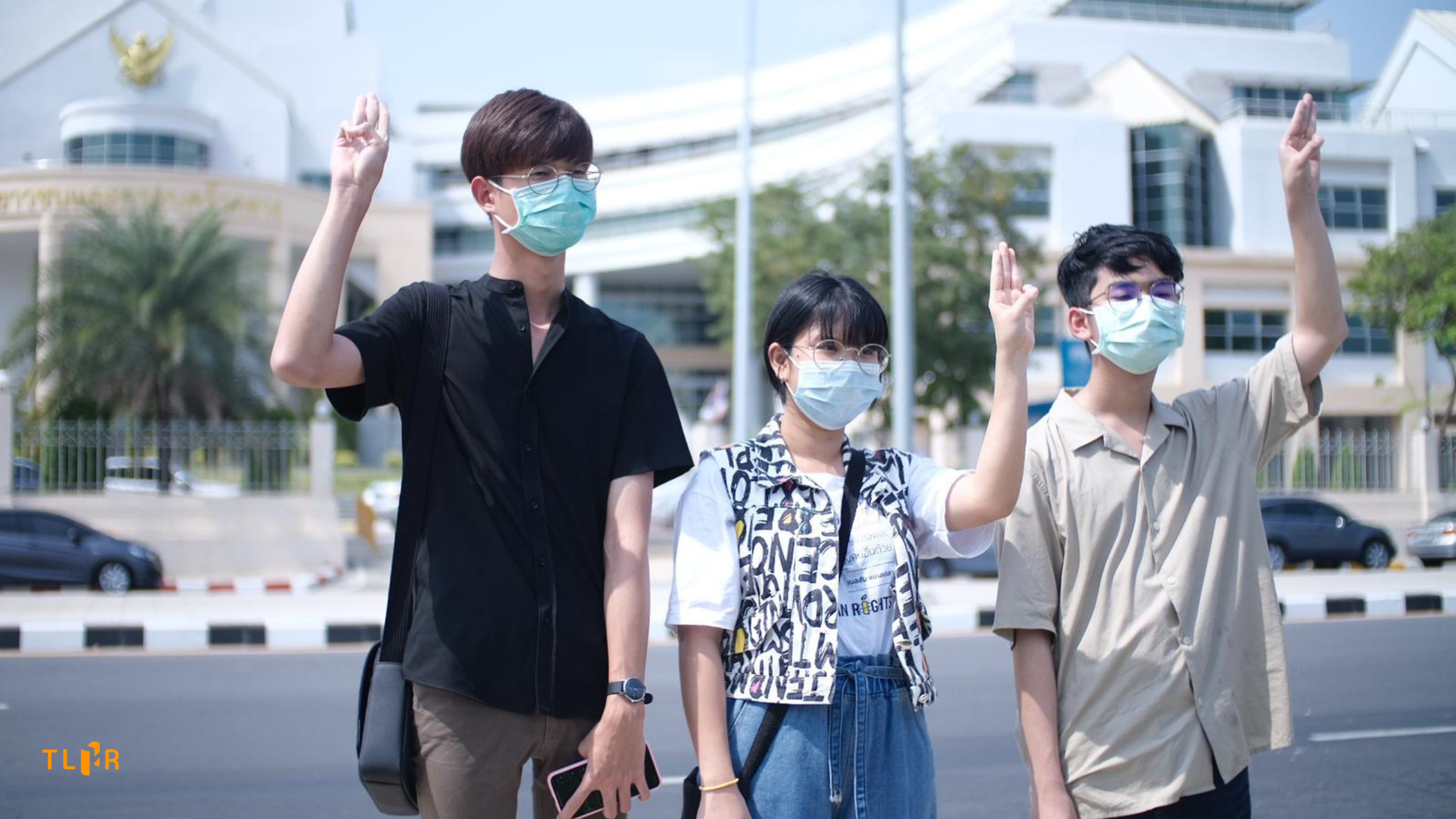
Despite no major rallies this month, the TLHR has found at least 20 activists and citizens had been harassed by authorities. Prominent activists were closely monitored, including ‘Ja New’ Sirawit Serithiwat, whom police visited at his house three times in a month, Chonticha ‘Lookgade’ Jaengrew and ‘Min’ Lopnapat from the “Bad Students” group, who noticed plain clothes police near their residences trying to locate them, and Natchanon Pairote from the United Front of Thammasat and Demonstration, who had two plain clothes police officers visiting his hometown home showing his relatives summon warrants.
In the northeast, state authorities approached politically active citizens who had placed signs in different locations. “Film” (alias), a 15-year-old student, who joined an activity by Roi Et Youth, got a house visit by 6-7 plain clothes police officers inquiring information from his parents and urging that they better take care of their child. Film suspected that the police’s move was a result of the fabric banners with text “Abolish 112” and criticism against the government seen at flyovers and other locations around Roi Et city during the New Year’s Eve celebration.
Two instances happened to members of the MSU Democracy Front in Maha Sarakam province last month: police cars from Mueang Maha Sarakam Police Station circled around the group’s rental house before stopping to examine something and the village head called villagers to inquire about the group’s movement.
Key cases updates
The civilian court delivered judgment on four section 112 cases carried over from the NCPO era, with one case carrying the imprisonment sentence of 87 years, the highest in the history.
In January 2021, the civilian court has delivered judgment on the “lèse-majesté” cases under section 112 occurred after the 2014 coup and cases tried by the Military Court, which had lasted for several years before being transferred to the civilian court.
Acquittal of “Thanakon” who liked a satirical Facebook page about “Khun Tongdaeng” and shared the Rajabhakti scheme.
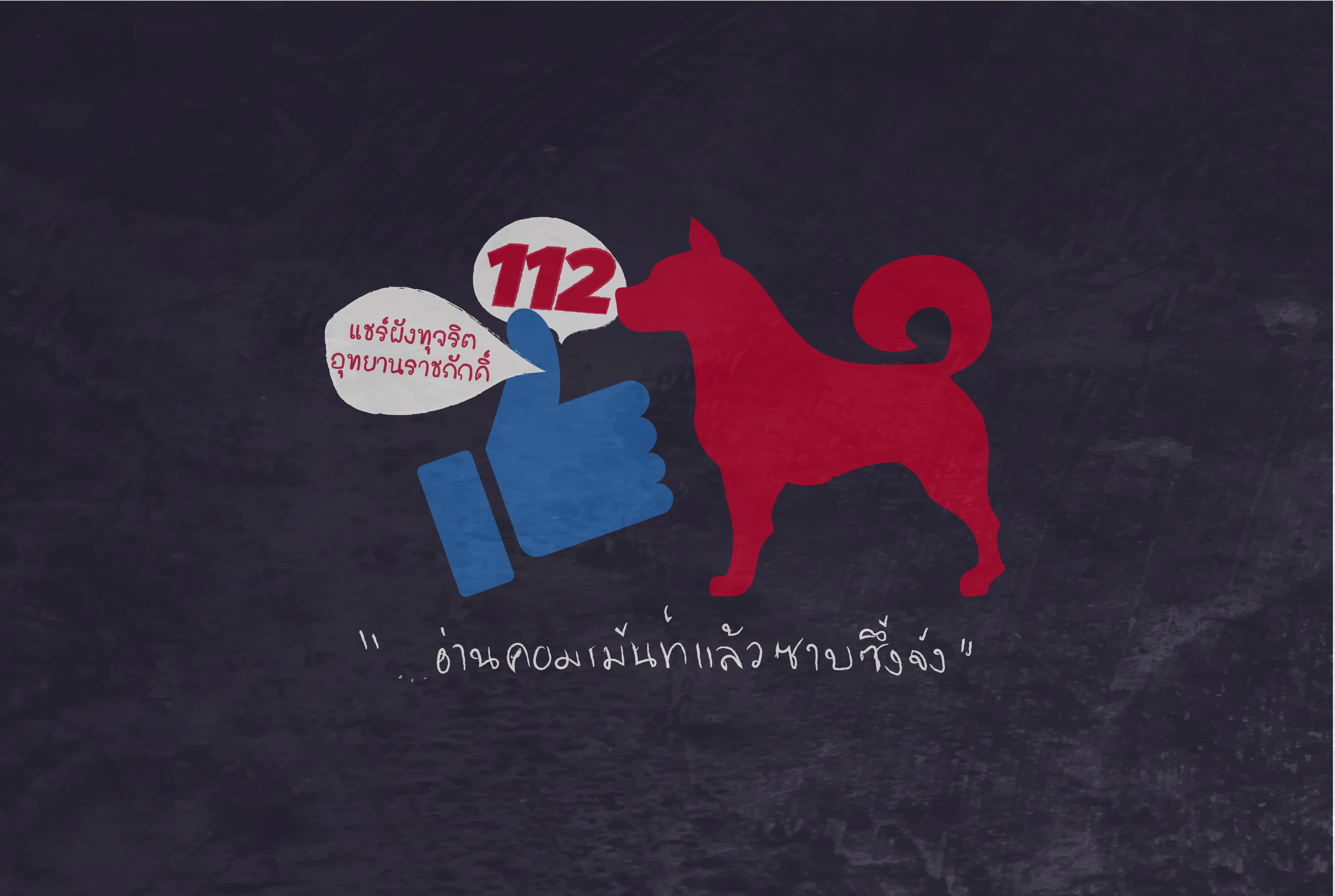
On 13 January 2021, the Samut Prakan Provincial Court read out the verdict acquitting Thanakon (last name undisclosed), who was accused with section 112 and the Computer-related Crime Act for liking and posting in the satirical Facebook page about “Khun Tongdaeng”, the former King’s pet dog, and with the “sedition” charge under section 116 appurtenant to the Computer-related Crime Act for posting the Rajabhakti Park corruption scheme.
The Court saw that liking a Facebook page with content violating section 112 could also suggest other things than liking it, as in the past Facebook only offered the ‘like’ function and no ‘follow’ function. Furthermore, liking a page did not automatically make it appear on someone else’s feed. Therefore, the Court decided to give the benefit of the doubt to the defendant. As for the typing of the text “I got so touched from reading the comment”, it still did not constitute the offence under section 112, either interpreted literally or ironically. Hence, the Court also gave the benefit of the doubt to the defendant. For the sharing of the Rajabhakti Park corruption scheme, the Court found that the defendant’s opinion was honest and thus not fell within the scope of section 116.
A 4-year-and-6-month imprisonment sentence for “Sirapob” in a section 112 case as text implies the monarchy is behind the political unrest.
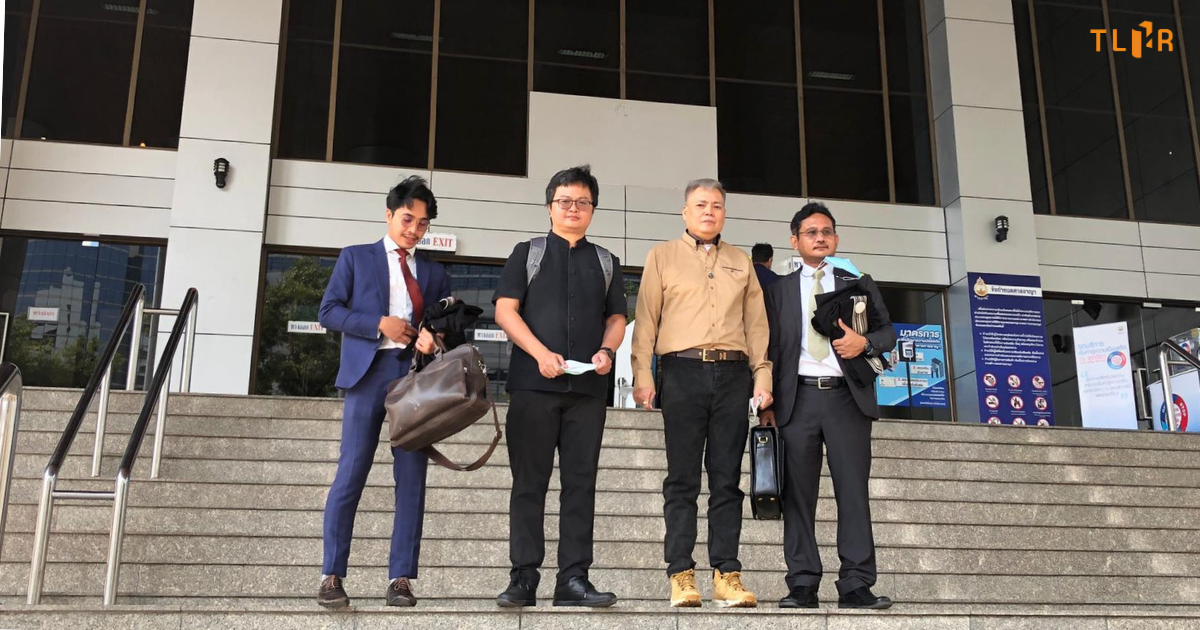
On 18 January 2021, the Criminal Court gave a 4-year-and-6-month imprisonment sentence for Sirapob (lastname undisclosed) in a case with offences under section 112 and Computer-related Crime Act. Sirapop had posted a poem and three statements, which, when taking into consideration the evidences and witnesses and the two alleged statements published between 2013-2014, indicated that the Defendant had a negative attitude towards the monarchy and tried to convince readers that the monarchy was behind the political unrest.
As for the other statement that the Defendant posted in Prachatai webboard in 2009, the Court found that it could be interpreted in line with the Defendant’s testimony, that it did not allude to the monarchy and, thus, gave him the benefit of the doubt. The Court ruled that the Defendant was guilty of violating section 112 with the two abovementioned statements and passed a sentence of imprisonment for 3 years each, totaling 6 years. As the Defendant had testified in favor of the case, the Court commuted the sentence to 4 years and 6 months. Having been detained during his trial under the Military Court without bail for 4 years 11 months and 22 days, Sirapob’s sentence term is considered completed.
The highest ever recorded 87-year imprisonment sentence for “Anchan” in a section 112 case for sharing the “Banpot” audio clip.

On 19 January 2021, the Criminal Court read the verdict for the section 112 and the Computer-related Crime Act case of “Anchan”, a former high-ranking public official who shared audio clips of “DJ Banpot”, an underground radio host, who created political content criticizing the monarchy in total 29 counts. The Defendant recanted her previous statements and confessed to the allegation. The Court ruled that the Defendant was guilty of all the 29 counts and passed a 3-year imprisonment sentence for each, totaling 87 years. Due to confession, the Court commuted the sentence by half to 1 year and 6 months for each count or 29 years and 174 months (around 43.5 years). As the Court had not allowed bail during appeal, the Defendant was promptly brought into detention after the verdict.
The said sentence of 87-year imprisonment is considered the highest of the section 112 cases ever recorded by the TLHR. The highest imprisonment sentence passed by the Military Court during the NCPO era was 70 years, concerning the case of “Wichai”, an employee of a private company, who was accused of creating a fake Facebook account and posting 10 texts with it.
Acquittal of “Uncle Bandit” in a section 112 case for expressing opinions about the constitution draft.
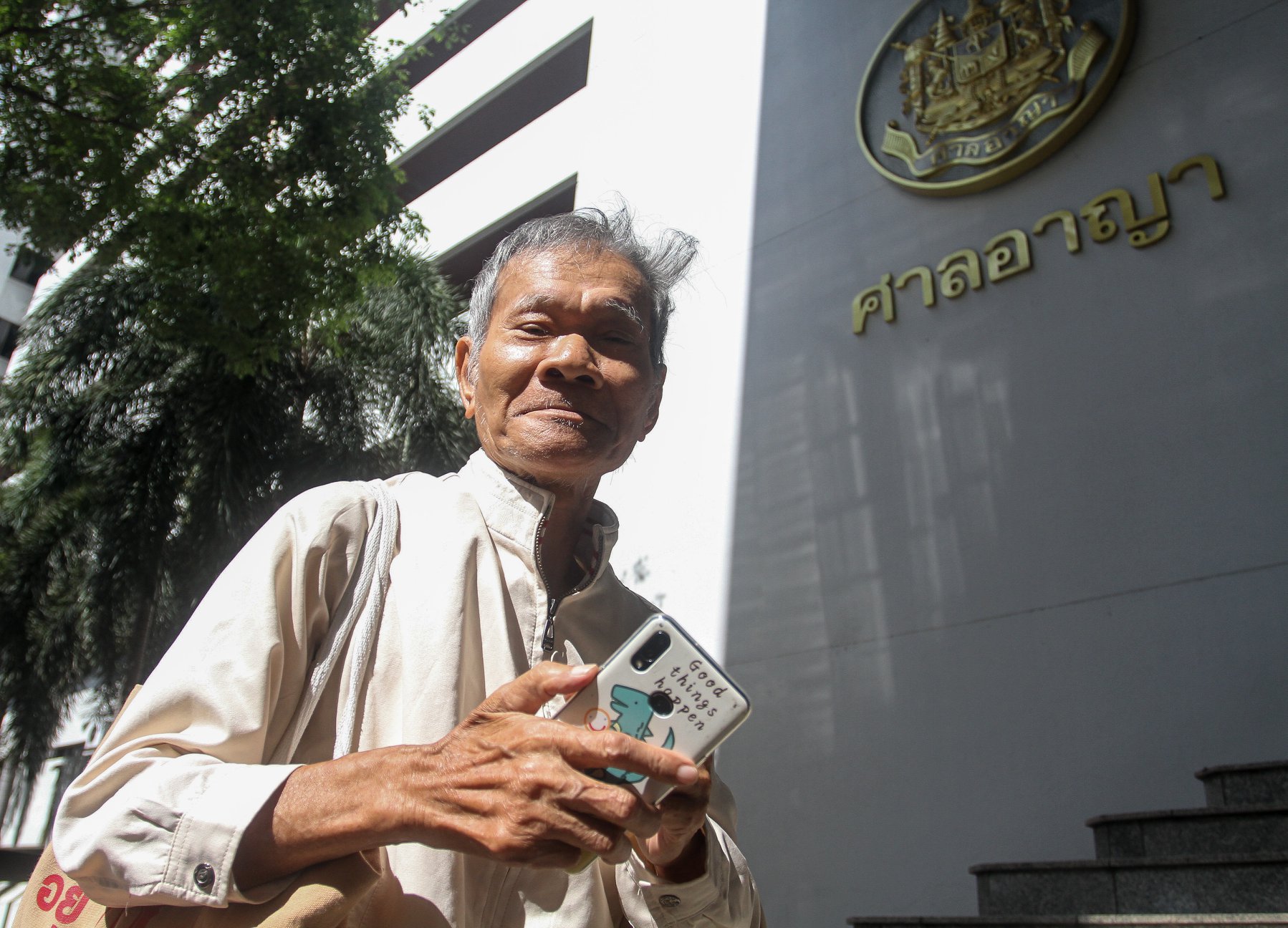
On 26 January 2021, the Criminal Court read the verdict of the section 112 case of Bandit Aneeya, a 79-year-old senior writer and translator, who had been accused of saying the statement “The human values and dignity of Thai people in the entire country must be higher than the dust under someone’s feet” at a public seminar on the constitution at Thammasat University in 2015. Seeing that the plaintiff’s witnesses’ opinions went back and forth between whether the statement in question fell within the scope of section 112 or not and that “dust” was an common, not a royal, word, the Court gave the Defendant the benefit of the doubt and acquitted him.
